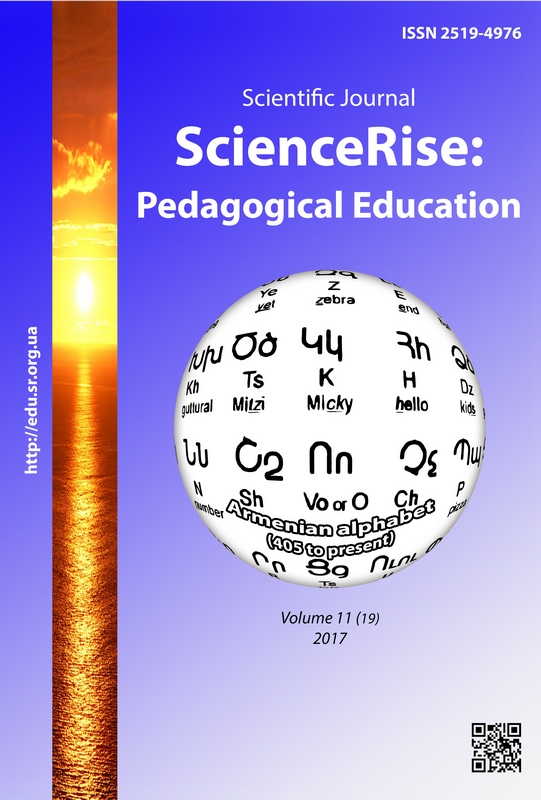Retrospective analysis of S. M. Trubetsky’s views on university autonomy
DOI:
https://doi.org/10.15587/2519-4984.2017.116322Keywords:
autonomy, academic freedoms, university, professorial corporation, collegiality, students, independence, constitutional stateAbstract
There were elucidated S. Trubetsky’s views on the state order, at which it is possible to introduce autonomy and academic freedoms in universities. The aforesaid principles of functioning, organization and activity of higher educational institutions are fully introduced just in a constitutional state.
It was established, that S.M. Trubetsky in first turn considered the cultural mission of a university. The necessary conditions of autonomy must be a support from the society and responsibility for own activity. Autonomy is realized through independence and collegiality of professorial corporation, free staff policy, court of honor, electivity of all posts. S.M. Trubetsky supported student associations only for academic interests.
It was proved, that rapprochement between teachers and students is the best way for realizing the university mission and prevention of student riots. S.M. Trubetsky introduced his propagandized principles in practice: created the student historical-philological community, organized learning excursions in different countries. In 1905 he became the first elected president of Moscow University
References
- Schetinina, G. I. (1995). Ideinaya zhyzn’ russkoy intelligentsii: konets XIX – nachalo XX v. [The ideological life of the Russian intelligentsia: the end of the XIX – the beginning of the XX century]. Moscow: Nauka, 236.
- Zubrytska, M. (Ed.) (2002). Ideia universytetu [The idea of the university]. Lviv: Litopys, 304.
- Humboldt, V.; Zubrytska, M. (Ed.) (2002). Pro vnutrishniu ta zovnishniu orhanizatsiiu vyschyh naukovyh zakladiv u Berlini [On the internal and external organization of higher education institutions in Berlin]. The idea of the university. Lviv: Litopys, 23–33.
- Universitetskaya ideya v Rossiyskoy imperii XVIII – nachala ХХ vekov [University idea in the Russian Empire of the XVIII – early XX centuries] (2011). Мoscow: Rossiyskaya politicheskaya entsiklopediya (ROSSPEN), 527.
- Vernadskii, V. I. (1908). Cherty mirovozzreniya kn. S. N. Trubetskogo [Features of the worldview book. S. N. Trubetskoy]. Russian thought, 4, 76–82.
- Demianenko, N. M. (2016). Dyskurs i praktyky universytets’koi avtonomii vid pochatky XIX st. do siohodennia [Discourse and practice of university autonomy from the beginning of the nineteenth century to presents]. Collection of scientific works of Korolenko Poltava National Pedagogical University. Series "Pedagogical Sciences", 65, 83–94.
- Kirdan, О. (2013). Pohliady profesoriv universytetiv na problemu upravlinnia vuschymy navchal’nymy zakladamy Rosiis’koi imperii (pochatok XX stolittia) [The views of university professors on the problem of management of higher educational institutions of the Russian Empire (the beginning of the twentieth century)]. Historical and pedagogical almanac, 2, 11–15.
- Namestnikova, I. A. (2000). Sergey Nikolaevich Trubetskoy i Moskovskiy universitet [Sergey Nikolaevich Trubetskoy and Moscow University]. Moscow, 262.
- Trubetskoy, S. N. (1904). Tat’yanin den’ [Tat’yana’s Day]. Russkie Vedomosti. Available at: http://letopis.msu.ru/content/trubeckoy-sn-tatyanin-den
- Trubetskoy, S. N. (1896). Po povodu pravitel’stvennogo soobscheniya o studencheskih besporadkah [Regarding the government report on student riots]. Moscow. Available at: http://www.odinblago.ru/publ_statii_1/1
- Trubetskoy, S. (1897). Universitet i studenchestvo [University and students]. Russian thought, IV, 181–203.
- Vernadskiy, V. I. (2011). Ob osnovaniyah universitetskoy reformy [On the basis of university reform]. University idea in the Russian Empire of the XVIII – early XX centuries. Мoscow: Rossiyskaya politicheskaya entsiklopediya (ROSSPEN), 384–400.
Downloads
Published
How to Cite
Issue
Section
License
Copyright (c) 2017 Mokliak Volodymyr

This work is licensed under a Creative Commons Attribution 4.0 International License.
Our journal abides by the Creative Commons CC BY copyright rights and permissions for open access journals.
Authors, who are published in this journal, agree to the following conditions:
1. The authors reserve the right to authorship of the work and pass the first publication right of this work to the journal under the terms of a Creative Commons CC BY, which allows others to freely distribute the published research with the obligatory reference to the authors of the original work and the first publication of the work in this journal.
2. The authors have the right to conclude separate supplement agreements that relate to non-exclusive work distribution in the form in which it has been published by the journal (for example, to upload the work to the online storage of the journal or publish it as part of a monograph), provided that the reference to the first publication of the work in this journal is included.







